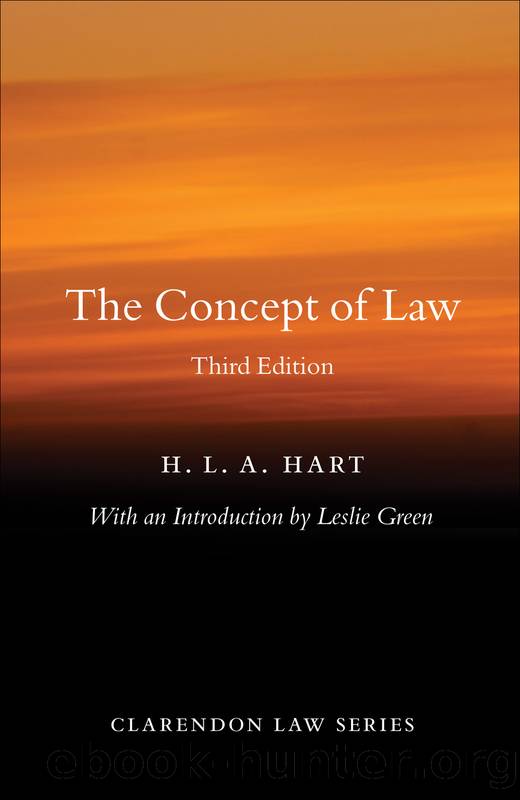Clarendon Law Series by H. L. A. Hart

Author:H. L. A. Hart
Language: eng
Format: epub
Publisher: Oxford University Press
Published: 2012-07-14T16:00:00+00:00
VIII
JUSTICE AND MORALITY
We have found it necessary, in order to elucidate features distinctive of law as a means of social control, to introduce elements which cannot be constructed out of the ideas of an order, a threat, obedience, habits, and generality. Too much that is characteristic of law is distorted by the effort to explain it in these simple terms. Thus we found it necessary to distinguish from the idea of a general habit that of a social rule, and to emphasize the internal aspect of rules manifested in their use as guiding and critical standards of conduct. We then distinguished among rules between primary rules of obligation and secondary rules of recognition, change, and adjudication. The main theme of this book is that so many of the distinctive operations of the law, and so many of the ideas which constitute the framework of legal thought, require for their elucidation reference to one or both of these two types of rule, that their union may be justly regarded as the ‘essence’ of law, though they may not always be found together wherever the word ‘law’ is correctly used. Our justification for assigning to the union of primary and secondary rules this central place is not that they will there do the work of a dictionary, but that they have great explanatory power.
We must now turn our attention to the claim which, in the perennial discussion of the ‘essence’ or the ‘nature’ or ‘the definition’ of law, has been most frequently opposed to the simple imperative theory which we have found inadequate. This is the general contention that between law and morality there is a connection which is in some sense ‘necessary’, and that it is this which deserves to be taken as central, in any attempt to analyse or elucidate the notion of law. Advocates of this view might not be concerned to dispute our criticisms of the simple imperative theory. They might even concede that it was a useful advance; and that the union of primary and secondary rules was indeed more important than orders backed by threats as a starting-point for the understanding of law. Their argument would, however, be that this is not enough: that even these elements are of subordinate importance, and that until the ‘necessary’ relationship with morality is made explicit and its central importance seen, the mists which have so long clouded the understanding of law cannot be dissipated. From this point of view the questionable or challengeable cases of law would not merely be the law of primitive societies or international law, which have been considered doubtful because of their lack of a legislature, courts with compulsory jurisdiction, and centrally organized sanctions. Far more questionable from this point of view is the title to be treated as law of those municipal systems which exhibit the full complement of juge, gendarme et legislateur but fail to conform to certain fundamental requirements of justice or morality. In the words of St Augustine1 ‘What are states
Download
This site does not store any files on its server. We only index and link to content provided by other sites. Please contact the content providers to delete copyright contents if any and email us, we'll remove relevant links or contents immediately.
The Secret History by Donna Tartt(16618)
The Social Justice Warrior Handbook by Lisa De Pasquale(11489)
Thirteen Reasons Why by Jay Asher(7786)
This Is How You Lose Her by Junot Diaz(5768)
Weapons of Math Destruction by Cathy O'Neil(5034)
Zero to One by Peter Thiel(4823)
The Myth of the Strong Leader by Archie Brown(4789)
Promise Me, Dad by Joe Biden(4444)
Stone's Rules by Roger Stone(4415)
Beartown by Fredrik Backman(4413)
How Democracies Die by Steven Levitsky & Daniel Ziblatt(4397)
The Fire Next Time by James Baldwin(4341)
100 Deadly Skills by Clint Emerson(4076)
A Higher Loyalty: Truth, Lies, and Leadership by James Comey(4031)
Rise and Kill First by Ronen Bergman(4012)
The David Icke Guide to the Global Conspiracy (and how to end it) by David Icke(3881)
The Farm by Tom Rob Smith(3871)
Secrecy World by Jake Bernstein(3782)
The Doomsday Machine by Daniel Ellsberg(3730)
